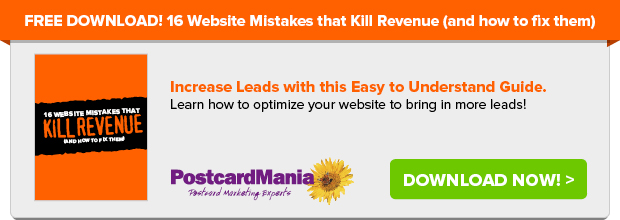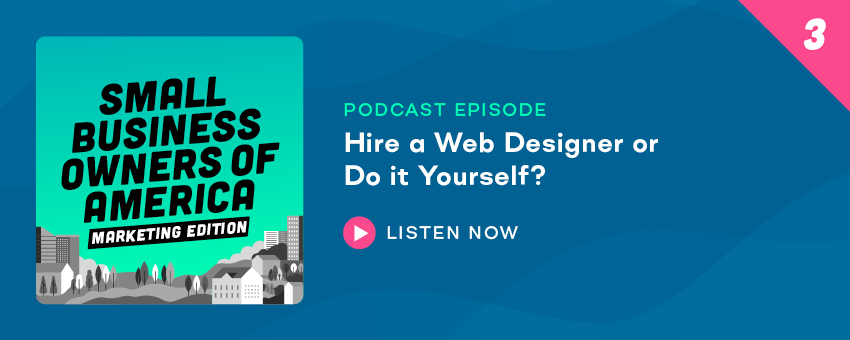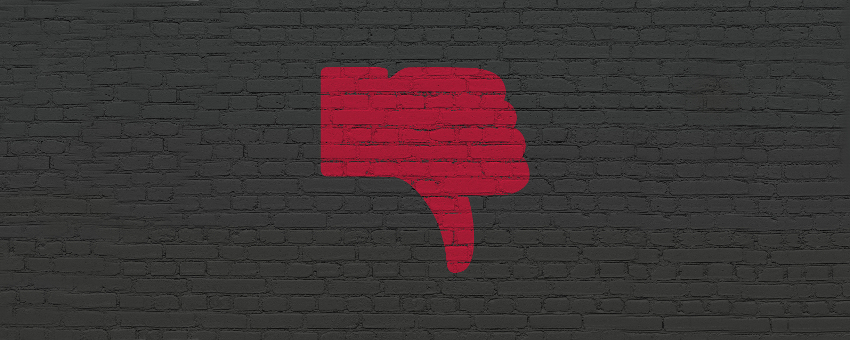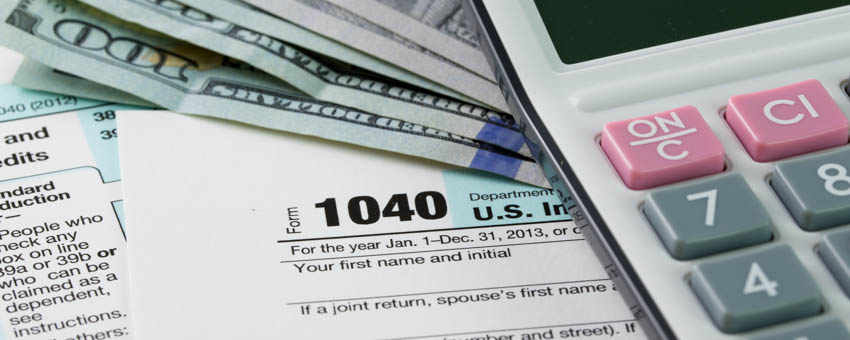Hire a web designer or do it yourself? (Podcast)
Updated on January 21, 2022The age-old question… what are the pros and cons of hiring a website designer? Do you really need one?
In this week’s podcast, we sit with one of PostcardMania’s tech specialists, who dives into the topic.
He’s going to tell you EXACTLY what you need for a successful website, and you can determine if you need to hire a designer or go at it solo!
You can also listen to this podcast on Buzzsprout, Spotify, and Apple Podcasts. Subscribe to get notifications for future episodes!
Here’s the transcription below of today’s episode, a conversation between our Director of Multimedia Content, Peyton, and Jonny, PostcardMania’s Online Product Delivery Manager:
Note: This transcription has been edited slightly for clarity.
Peyton: Should I DIY my website or hire someone?
If I click on a website and the page pops up, I can almost instantly know if I will continue scrolling or not. A little technical here, but it takes about 50 milliseconds, that’s 0.05 seconds for users to form an opinion about your website that determines whether they like your site or not and whether they’ll stay or leave.
I’ve seen enough bad websites in my day to tell what is good and what isn’t. I’m not even a web developer and I know. We can all agree that having a website is Basic Mandatory Business Must-Haves 101, right? It’s vital to your business, the lifeblood of your online presence. What we can’t seem to agree on is how to build that website. That’s why I have Jonny here to help us understand the important aspects to consider when building a website. Hi, Jonny!
Jonny: Hello, Peyton. Thanks for having me.
Peyton: Of course! So Jonny Lawrence entered the web industry in 2004 working in tech support and project management for companies that provided web-based content management systems and financial software. Having already been exposed to branches of design and development, he started fully designing and programming websites in 2012. He brought those skills to PostcardMania in 2018, continuing both web design and web development, later focusing solely on development.
Today, Jonny is the online product delivery manager here at PostcardMania, leading a tight-knit team of copywriters, designers and developers to create effective and informative marketing tools on the web. So he knows about websites, you guys. So for starters, Jonny, what is the point of having a website?
Jonny: Well, that’s a pretty loaded question. But, in short, the website is a major extension of your business. When you’re asleep or when your business is closed, your website is still available. It’s still there to educate prospects about your business and the products and services it offers, to take orders, and to collect leads. So having a website is in some ways like having a 24 hours a day 365 days a year operation.
This is a good example of how a website can automate your business, and by that I mean it can do things that you can’t. Imagine you have a product to sell and you’re the only employee in that business. Without the website, how are people going to order your product? Do they have to give you a call and hang up because you’re already on the phone with someone else and you can’t take their order? Or are they emailing you and you’re not able to reply since you’re on the phone with another customer? The website can take those orders automatically, bring in those leads when you’re asleep, or when you’re working with another customer.
The website can also answer any questions about shipping or payment methods, or if they have questions about your services or products. You don’t have the time to educate everyone one-on-one. That’s what the website is for – to educate your customers. Provide them the services that you can’t do when you’re not with them directly.
On that note, next time you go to the mall or a park (or anywhere), just take a look around at people. What are they doing? They’re probably on their phone, right? Maybe they’re browsing the web, checking their feeds on social media, watching YouTube videos, or even checking their email. And every single one of those is an opportunity to direct them to your website, whether it’s a little ad between screens on a mobile game or whatever other digital advertising. Chances are, if there’s someone using their phone, there’s an opportunity to direct them to your website. And if you don’t have the website, you just lost the opportunity to get them as a customer or get them as a lead.
Peyton: Right, you just made so many good points. One of my favorite is that not all of small businesses have 50, 100, 250 people. Sometimes it’s just one person in their room making personalized sweatshirts on an Etsy store or something like that online. And they don’t have the manpower to do that.
Or if you have a bigger business, you don’t have the time to take all of those calls and leads at once, so that website is really crucial to have so that you can get to those later – or automate the process. I also liked the point that that without a website, you lose opportunities.
I think that the very key point is, there is so much opportunity lost and so much opportunity to have when you have a website. If I went the route of creating my own website, how long would it take for me to create my own website?
Jonny: Okay. So that’s a really good question, and it’s a question that we get asked a lot in our corner of the industry in marketing. But that can go anywhere from a couple of hours to a year or two. It really depends on the functionality, of course, and the features that you want to include on your website.
But the takeaway is this: with a broad question like, “How fast can I get a website up if I want to do it myself?” Sure, you can make a Wix site. I don’t know, maybe within a day or two your website is up. Or any of the other free website builders that have hidden fees after you subscribe with them.
But the key takeaway is this: great things just sometimes take a little bit longer. So at PostcardMania, we can get landing pages up the same day, sometimes or within a few days. Typically, landing page might take about a week, sometimes a week and a half, depending on how quickly we can communicate with the customer.
Custom websites, we’ve seen those go a month or two for bigger projects. These are projects where the customer has very, very specific needs. But in the end, yes, they waited a little bit longer amount of time, but they got everything that they needed, and it’s done exactly how they wanted it.
Peyton: Can you quickly tell me what the difference between a landing page and a website is?
Jonny: Sure. So a pretty big misconception is, “I don’t need a website, I’ll just have a landing page.” They’re not the same thing.
The websites are all-inclusive: visitors know what the brand is, there’s ways to contact the business, there’s ways to learn about purchase, or a way to subscribe to the service or product. A landing page has a singular focus.
So for example, a lot of landing pages that come through our department are for dental offices. One dental office might have a landing page specifically for free X-rays. It’s just a way to get them in the door. “We want to give you some free X-rays so we land you as a customer.” The landing page is not the dentist’s office full website. The full website is somewhere else. That landing page only has a singular focus to get people interested in free X-rays and get them in the door; everything else comes later. The main goal of a landing page (good landing pages anyways) is a singular focus, not to provide all this about information and show pictures of your cats and everything. Just state your offer, get people in the door.
Peyton: Okay, great. Thank you for clarifying. So what could I miss if I created my own website? Or rather, what could a company like PostcardMania or another company of web designers or web developers ensure that my website is really good?
Jonny: Sure. So the short answer is everything.
For example, let’s say I’ve done some home improvement projects around my house, and let’s say I want to build a new house. That doesn’t mean that I know how to frame a house and build it from scratch. Just because I’ve watched a few YouTube videos or a TikTok video or something with some DIY tips, doesn’t make me an expert. I’m just learning about this stuff.
Yes, you can read an article that teaches you the basic fundamentals and stuff, but that doesn’t mean that that’s your foundation. A good website is going to be created by someone who has a foundation in the industry with experience, and they do it well. Not just experience, but they do it well.
And luckily at PostcardMania, we have some people that have both experience, they do it well, and thus we make some very effective web products. Yeah, you can install a free WordPress website or something like that. Sure, you can do that. But how effective is it going to be, if it’s built by a machine? No offense to anyone that’s doing this themselves. Props to you. But there’s little things you’re going to miss. Like do you have title tags on your images for screen readers for people that have trouble seeing a monitor or are actually blind?
Peyton: Accessibility.
Jonny: They are using screen readers. Are you thinking about those kinds of things? Are you thinking about proper color contrast? Another thing, there are different levels of color blindness, and if you have a light gray text on a dark gray background, that might be difficult for some people to see.
We can go off and list millions of things. But there’s tons of things that can’t be taught, mostly they’re learned. And that’s not going to happen if you’re just diving right in and trying to build your own website in this week or this day. Let an expert handle it.
Peyton: Yes, and that leads me to my next question. Say I decide to hire someone. Who am I looking for? Am I looking for a web developer? Or am I looking for a web designer?
Jonny: So ideally, you want both.
At PostcardMania, with our custom projects, we have the best of both worlds. A new website project would come in, we get all the materials and copy, and then hand that off to someone who is an expert in only web design. Then, they’ll create a mock-up of what we think the website should look like to make sure that the website design is going to meet the goals of that business. That designer works closely with the web programmer or developer to make sure the things that they’re designing are actually possible to do, and that we’re working within browser constraints and mobile-friendliness and everything.
Once that goes over to the programmer, then the programmer is an expert in programming, and they’re going to program that website from the ground up, line-by-line writing code, making sure that the graphical representation that was provided during the design process is accurately reflected live on the Internet.
Peyton: So when I’m trying to create my website, I’m talking back and forth to the web developer and web designer. What are some of the 10 essential elements to every good website design?
Jonny: I know the answer that you’re looking for, but we’ll try to simplify that. One is brand continuity. At the most basic level, make sure that your logo that’s on your business cards and on your postcards looks the same as the logo that’s on your website. That the colors are matching, not that there’s just in the same color family, but they’re the exact same color. Brand continuity is super important.
Make sure that your website is actually providing something that people want. Around 2005-2006, everyone was writing blogs. And everyone had these free blog websites and everything, and wondering why no one was visiting them. No one really cares that you fed your cat this morning and then stepped on a twig. So the end of it is that those blog posts weren’t something that people were looking for. But if I’m looking for a really great phone with an awesome camera on it that can hold all of my photos of my kids and everything, then I’m probably gonna go to apple.com and see what kind of phones they have. Because they have something that I want.
Jonny: This topic is more geared toward the landing pages. We do see sometimes where a customer wants a landing page and they’ve got all these ads that are directing people to the landing page. And a prospect or a website visitor gets to the landing page and they see a form, and the form is asking them for their personal information. And I don’t know about you, but I’m a little hesitant to provide my personal contact information. However, I am very willing to provide my contact information if there’s something they are offering that I want.
Peyton: 100%.
Jonny: So if I’m gonna get a coupon code for 25% off of something that I wanna buy, well, that’s a pretty good incentive.
Peyton: Let’s do it.
Jonny: Yeah, I’m gonna throw my email address in there and hit the submit button and go to town. What’s really important is that you have something that people want, an offer. If you’re just looking for leads and you don’t really have a way (to attract them they won’t provide contact info).
If you’re a realtor, you don’t really have a discounted rate or something that you can provide, but you can maybe provide the top 10 home staging tips to sell your home, or a report on recent home sales in your area so you know how to price your home. Some valuable information that you can give in exchange for that email address. Give them some incentive to provide their contact information.
Peyton: We’ve talked about some good elements of website design, but it all comes down to generating leads and getting those people to buy your product or to buy your service, because that’s how all small businesses survive. So if I have my website, how can I transform everyone or anyone that comes to my websites into leads?
Jonny: Yeah. Awesome question. And this goes back to what we just talked about. You have to have something that people want. Here’s a good example. Have you ever heard of lingscars.com?
Peyton: No.
Jonny: Okay. Not a lot of people have. If you ever go to lingscars.com, your stomach might feel a little bit sick or you might pass out. It is one of the most gruesome websites you’ve ever seen in your life.
Peyton: Oh, no, I’m going right now.
Jonny: But this company provides auto leases at major discounted rates, and as ugly as this website is, it’s effective because it’s providing something that people want. Now this is a very, very niche case and I don’t recommend that you design your website like LINGsCARS, okay? She spent a lot of time building up her brand and everything, but the end of it is that she’s very successful because she has a service that people want, she has great prices on her auto leases, and people know to go to her website. And she’s the number one car leasing business in the entire UK.
Peyton: For you guys that are listening while you’re driving and don’t have access to your phone right now, I am currently on her landing page and it says, “Car leasing for adults, not idiots.” And then there’s a Santa Claus driving a car, little graphic, and then I just went to her website. But you guys have to check it out. It’s quite…
Jonny: Yeah. It’s best viewed on a desktop, if you can. If for anything, it’s just comical and funny just to see it.
Peyton: Now, Jonny, is there anything else that you can think small businesses would benefit to know about having a website, buying a website? Or if after all of this, they think that they can still make their own website?
Jonny: Sure. So for a small business just getting started, you have a website and you have a small business, do the thing that you’re good at.
If your business is landscaping, then focus on landscaping, and delegate the website to somebody else. If you want to make changes to that website, tell that other person to just do it. Hire someone. There’s probably gonna be a cost involved, but it’s an investment in your business. That way, your sole focus can be on doing what you know best, which is landscaping, or installing granite countertops, or your dental office, whatever it is. Have an expert in websites take care of the website for you. That would be what my biggest tip, I think, for a small business.
Peyton: Right. And even if you hire somebody else to do it, like Jonny said, you can still have a lot of control and input on what goes on the website, and you can probably have input on the color scheme and the images that are put on.
You’re just having somebody there to help you like an event planner. You have a lot of the input on what goes on. Or like when you’re getting married, you have a lot of input on what goes on. But they’re the expert, they know who to contact, they know how to build your dream wedding, or dream website, in this case.
Jonny: Exactly. And I’m thinking about some of our most successful customers. Our most successful customers that have the most website traffic are the ones that are completely hands-off. They might have an idea of something that they want to add to their website, but they delegate that to us. They might have an idea about a blog post. They’ll give us some general information, we’ll write the blog post for them and post it for them on their website. So it’s the ones that can see past a number value, because that can be scary for a lot of people (especially for a small business) but they can see past that number and see towards what that will do in the future. They see it as an investment, and delegate all of those tasks to us. For those most successful customers, the majority of them, and let’s italicize the word “majority,” the majority of them purchase SEO services because the SEO services work.
Peyton: Which is search engine optimization, and you will hear about it on another episode because it’s a whole topic within itself.
Jonny: And to go back to your question earlier about the 10 essentials for a website design, we do actually have a report that list those out, if you’d like to see a more granular report of the things that we recommend. And you can download that at postcardmania.com/websitereport.
Peyton: Yes. And again, thank you, Jonny, for being here. And I hope you guys took away from this. Hire the experts to do your website so that you can do your own job, and you don’t have to stress over that website. Okay, you guys? Alright. And don’t forget to go on postcardmania.com and follow us on social media @postcardmania on Instagram and on Facebook. And I hope to see you guys next week for some more marketing tips and tricks.






